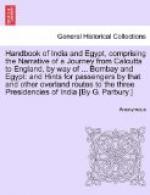Hark, through the hum of the crowd, above the rumble of wheels and the jangle of bullock-bells, rises the plaintive chant of the Arab hymn-singers, leading the corpse of a brother to the last “mukam” or resting-place; while but a short distance away,—only a narrow street’s length,—the drum and flageolets escort the stalwart young Memon bridegroom unto the house of the bride. Thus is it ever in this city of strange contrasts. Life and Death in closest juxtaposition, the hymn in honour of the Prophet’s birth blending with the elegy to the dead. Bag-pipes are not unknown in the Musalman quarters of Bombay; and not infrequently you may watch a crescent of ten or twelve wild Arab sailors in flowing brown gowns and parti-coloured head-scarves treading a measure to the rhythm of the bagpipes blown by a younger member of their crew. The words of the tune are the old words “La illaha illallah,” set to an air endeared from centuries past to the desert-roving Bedawin, and long after distance has dulled the tread of the dancing feet the plaintive notes of the refrain reach you upon the night breeze. About midnight the silent streets are filled with the long-drawn cry of the shampooer or barber, who by kneading and patting the muscles induces sleep for the modest sum of 4 annas; and barely has his voice died away than the Muezzin’s call to prayer falls on the ear of the sleeper, arouses in his heart thoughts of the past glory of his Faith, and forces him from his couch to wash and bend in prayer before Him “Who fainteth not, Whom neither sleep nor fatigue overtaketh.”
During the hot months of the year the closeness of the rooms and the attacks of mosquitoes force many a respectable householder to shoulder his bedding and join the great army of street-sleepers, who crowd the footpaths and open spaces like shrouded corpses. All sorts and conditions of men thus take their night’s rest beneath the moon,—Rangaris, Kasais, bakers, beggars, wanderers, and artisans,—the householder taking up a small position on the flags near his house, the younger and unmarried men wandering further afield to the nearest open space, but all lying with their head towards the north for fear of the anger of the Kutb or Pole star.
“Kibla muaf karta hai,
par Kutb hargiz nahin!”
The Kibla forgives, but the
Kutb never!




